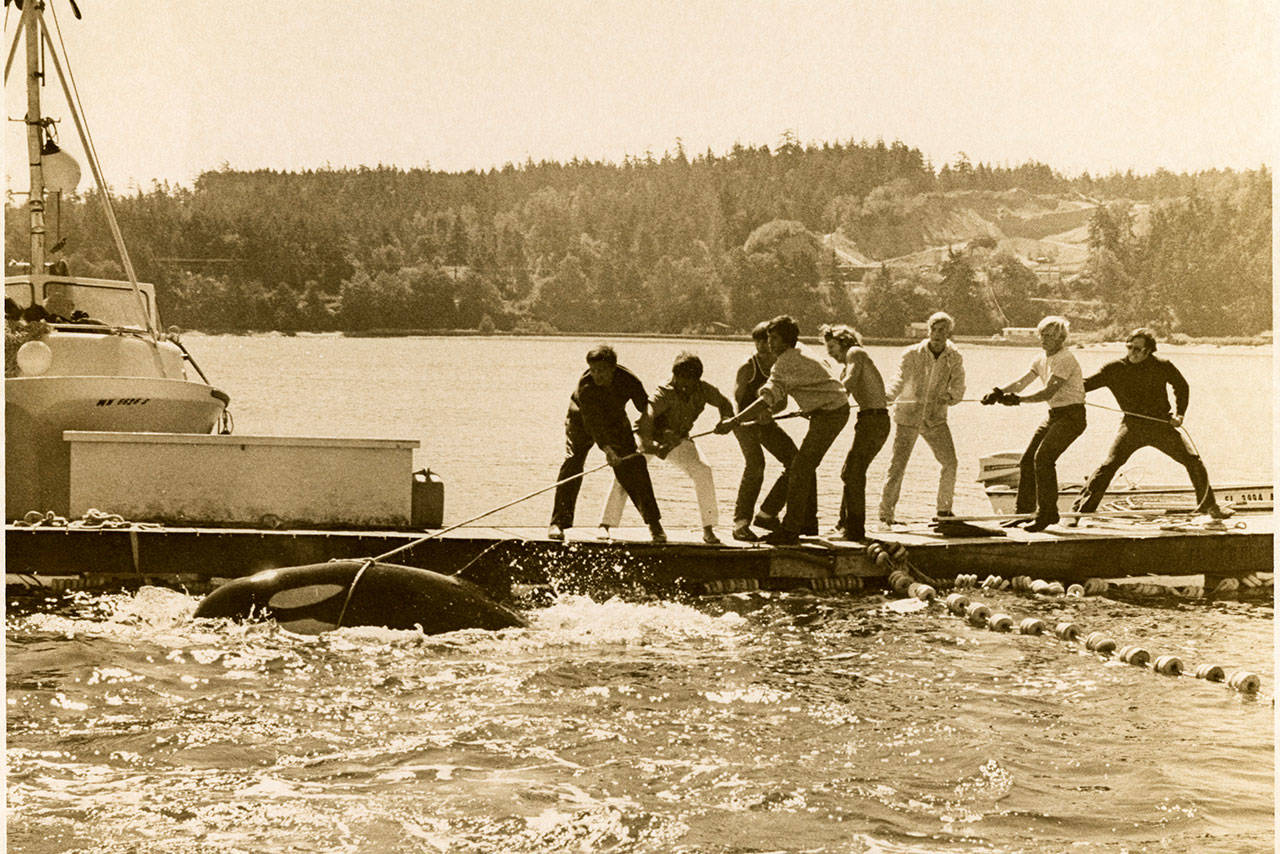They’re known as “orca dorks,” and Sandra Pollard is proud to say she’s one of them.
Bound by an inexplicable love for the black-and-white creatures of Pacific Northwest waters, they recite the attributes of the once-feared blackfish like a baseball fanatic reciting stats.
Orcas have a huge brain — four times larger than that of a human.
Their distinct social hierarchy known as pods are led by females; their complex form of vocalizations help them hunt and travel together. They are smart, articulate and addictive.
All it takes is witnessing the graceful movements and fascinating formations of the local killer whale pods only once to get hooked.
Just ask Pollard, who grew up in Cornwall, England and saw her first Southern Resident orcas off Cattle Point, San Juan Island in 1991.
“The encounter left a powerful impression on my mind,” she said.
Then she learned about a killer whale named Lolita, the lone survivor of dozens of orcas to be legally captured in Whidbey Island waters during the 1960s and 1970s for marine park exploitation.
Once known as Tokitae, Lolita has been performing twice a day for almost 50 years, leaping, whirling and splashing about in a concrete tank that’s 80-feet long and 20-feet deep.
“I had a strong desire to know more about how this could have happened,” recalled Pollard.
“I felt that Lolita’s story, and that of the other whales, needed to be told and to draw attention to the ongoing plight of Lolita and her family.”
In 2014, she released the book, “Puget Sound Whales for Sale: The Fight To End Orca Hunting” and had no plans to write any more on the subject.
But then a particular pod of killer whale lovers native to Whidbey Island called the Orca Network seemed to be successfully stirring up the waters about a plan to retire Lolita to a sea pen off Orcas Island.
Saturday, at the annual Ways of the Whales Workshop in Coupeville, Pollard will be on hand to sign her follow-up book, “A Puget Sound Orca in Captivity: The Fight To Bring Lolita Home.” Both books are published by Arcadia Publishing/The History Press.
The workshop features a variety of talks by experts; topics include salmon habitat contaminants, harbor porpoise health and an update on Southern Residents. It’s open to the public and tickets costs $25 to $35.
“What is significant is the urgency of restoring salmon so our Southern Residents have a chance to survive,” said Susan Berta, who co-founded the Orca Network with her husband, Howard Garrett.
When the Lummi Tribe vowed to bring Tokitae back to the Salish Sea, her family and the “place in her heart” in 2017, the addition of an indigenous voice jump-started the Free Lolita campaign.
In May 2018, the tribe led a 9,000-mile, 27-day Tokitae Totem Pole Journey from Bellingham to Miami, raising awareness along the way with rallies and a 16-foot whale totem pole.
Bad press and relentless protesting at the entrance to Miami Seaquarium is making a difference, said Garrett, who’s been waging a battle on Lolita’s behalf for some three decades.
“I do see pressures building on the Seaquarium that could expedite the management there and the owners, Parques Reunidos in Madrid, to cut bait and begin to divest themselves of the liability of holding Lolita much longer,” he said.
Pollard said Garrett’s industrious record-keeping combined with advocates’ tireless passion motivated her to sift through all the hurdles of the Lolita campaign, such as “petitions, lawsuits, bureaucratic lassitude and obfuscation, agency maladministration and corporate greed” and continue writing the story.
She aims to convey Lolita’s strength and fortitude.
“The book is a tribute to Lolita’s stoicism and ability to survive,” Pollard said. “She must have a strong spirit and great inner strength.”
Despite writing at length about the famous whale, Pollard said she can’t bring herself to visit Lolita.
“I would find it extremely upsetting to see such a magnificent creature forcefully contained in such unnatural surroundings, ” Pollard said, “especially having had the privilege of seeing her family, and presumed mother, frequently in the wild.”
• For Ways of the Whales Workshop information and to register online, go to www.orcanetwork.org
• For Sandra Pollard’s books, go to www.facebook.com/WhalesforSale/



